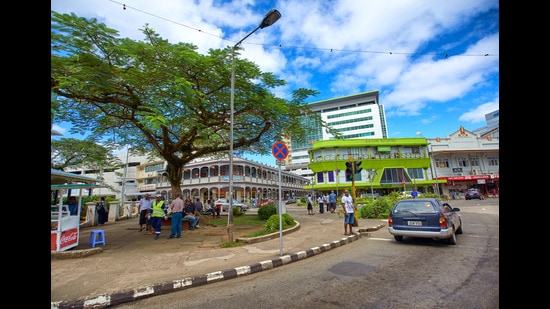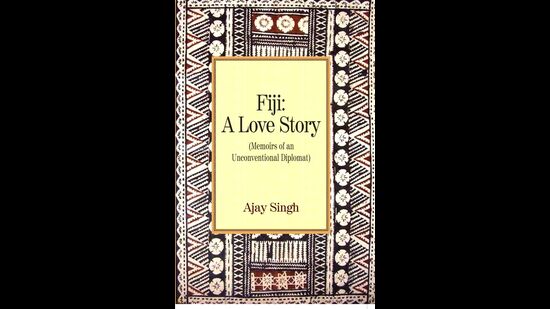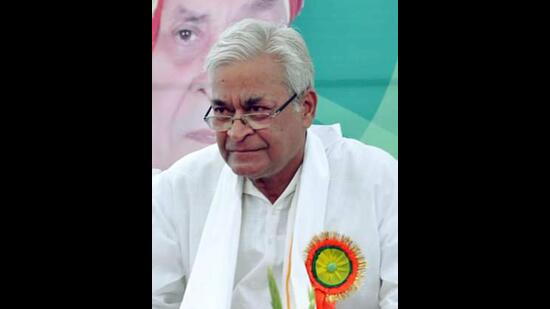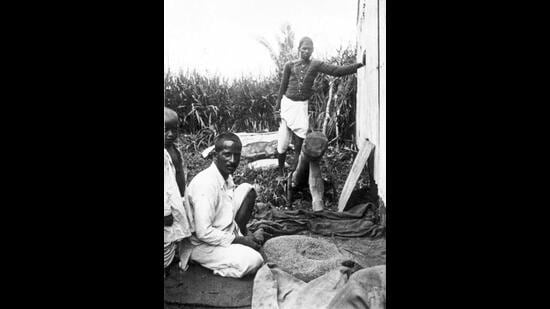Review: Fiji: A Love Story by Ajay Singh
The memoirs of the former Indian ambassador to Fiji highlight, through his own family’s history, the iniquities of the colonial indentured system whose consequences continue to embitter that nation’s politics
Ajay Singh’s memoirs, published two years after he died aged 70, are multilayered much like the man himself, who excelled as a journalist, politician, social worker and diplomat. He could have written with insight on any of these aspects of his life but, unsurprisingly, chose to devote his autobiographical work to Fiji.

This island country in the South Pacific Ocean has played an enormous role in the history of his family, beginning with his great grandparents Ram Chander and Padam Kaur, who reached the then British colony as indentured labour in 1885. The connection continued with his grandfather, Bere Singh, a man of great self-respect and honour who worked in the Fiji colonial administration for 16 years. Later, his father, Bhagwan Singh, a distinguished administrator, and he himself represented India as High Commissioners to independent Fiji. Ajay also married a Fijian Indian, Shiromani, an accomplished person in her own right who died of cancer in 2017. Their love for each other shines through the book.

Ajay has succeeded remarkably in highlighting, through his family’s story, the iniquities of colonialism, particularly manifested in the indentured system. Its consequences embitter politics in Fiji even today. Ethnic Fijians believe they should control the country’s political destiny while descendants of Indian indentured labourers, many of whom have prospered, demand true equality in keeping with constitutional guarantees. This lies at the core of Fiji’s political problems, which led to military coups beginning with the one in 1987 ousting what was considered an Indian-dominated government. The evolution of ethnic Fijian society from feudalism to egalitarianism has been an added complication. Ajay brilliantly clarifies the phases of Fijian politics from the colonial period to his father Bhagwan Singh’s tenure as High Commissioner for five years from 1971 to 1976 and his own in the same office in Suva from 2005 to 2007. Both father and son tried to reconcile ethnic contentions in Fiji keeping in mind India’s interests but their efforts were, at times, controversial with sections of the ethnic Indian community there.
For this reviewer, what is truly fascinating is the sheer human drama of Ajay Singh’s great grandparents’ life in Fiji and the heroism of his great grandmother. His use of the word “epic” for her struggle is entirely justified. Like lakhs of Indians who became victims of the indentured system, Singh’s grandparents were lured by unscrupulous agents through stories of making fortunes in faraway lands. They were taken to Calcutta and shipped to Fiji, reaching the islands in 1885.

Ram Chander and Padam Kaur had been toiling in a sugarcane farm for almost five years when the former was implicated in a false case of arson and sentenced to 15 years imprisonment in the capital, Suva. Padam Kaur, who, by then, was the mother of a two-year-old son, was left defenceless and almost at the mercy of her husband’s enemies. It was then that her husband’s friends ensured her safety and, with the “backing of the local Fijian chief Ratu Jone Madraiwiwi”, organised her escape from the farm and enabled her to board a ship that took her to Suva. The fact that a Fijian chief helped Padam Kaur shows that Indian indentured labour and local Fijians were not as contactless as historical accounts indicate. This opens up interesting pathways for historical research into ethnic relations in the colonial period.

Ajay gives a fascinating account of the struggle that she waged for three years to secure justice for her husband. Despite numerous difficulties, she finally succeeded with the help of some sympathetic colonial administrators who realised that Ram Chander was the victim of a trumped-up charge. She was also helped by a Roman Catholic missionary. Singh notes that the compassion shown “convinced Padam Kaur to be converted to Christianity. She now had a new name — ‘Parbotti’.” After Ram Chander’s release, the couple worked in government jobs in Fiji and returned to India after spending 16 years in all in Fiji. At that time, their son Bere Singh was 13. Back in India, Padam Kaur returned to the old Hindu traditions but a picture of Christ adorned a wall of her house. (The reviewer was told this by Ajay Singh’s father Bhagwan Singh).
As India’s interests grow in the Indo-Pacific, it will have to pay greater attention to the South Pacific Island states which have been long dominated by Australia and New Zealand. As Ajay Singh notes, “an expansionist China” is also purposefully moving in. The Modi government has made some moves in this direction but more needs to be done.
Mahavir Singh and Shubha, Ajay Singh’s sister, deserve thanks for putting in shape for publication the manuscript that he left behind. It makes for a marvellous read.
Vivek Katju is Ex-Secretary, Ministry of External Affairs..
Continue reading with HT Premium Subscription




